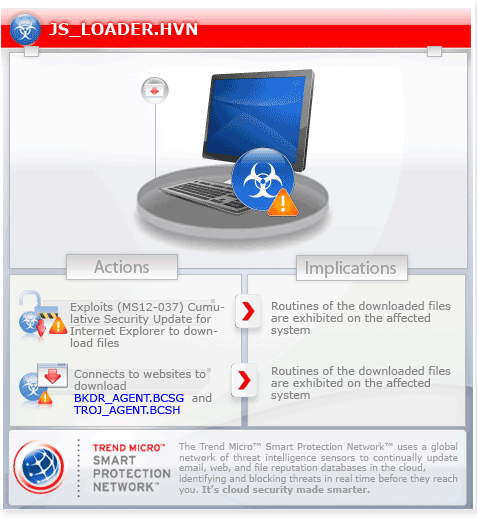JS_DLOADER.SMGA
Exp/20121875-A (Sophos); Exploit.JS.CVE-2012-1875.a (Kaspersky); Exploit:JS/ShellCode.AV (Microsoft)
Windows 2000, Windows XP, Windows Server 2003


Threat Type: Trojan
Destructiveness: No
Encrypted: No
In the wild: Yes
OVERVIEW
This malware exploits a vulnerability in CVE-2012-1875, which is addressed in MS12-037 bulletin.
To get a one-glance comprehensive view of the behavior of this Trojan, refer to the Threat Diagram shown below.

Once this malware exploits the vulnerability, it downloads malicious files.
This Trojan executes the downloaded files. As a result, malicious routines of the downloaded files are exhibited on the affected system.
TECHNICAL DETAILS
Arrival Details
This Trojan may be downloaded from the following remote sites:
- http://{BLOCKED}.{BLOCKED}.241.239/css.htm
Download Routine
This Trojan accesses the following websites to download files:
- http://{BLOCKED}.{BLOCKED}.241.239/javaw.exe - detected by Trend Micro as BKDR_AGENT.BCSG
- http://{BLOCKED}.{BLOCKED}.236.143/english/cala.exe - detected by Trend Micro as TROJ_AGENT.BCSH
It takes advantage of the following software vulnerabilities to download possibly malicious files:
It saves the files it downloads using the following names:
- %User Temp%\log.gif
(Note: %User Temp% is the current user's Temp folder, which is usually C:\Documents and Settings\{user name}\Local Settings\Temp on Windows 2000, XP, and Server 2003.)
It then executes the downloaded files. As a result, malicious routines of the downloaded files are exhibited on the affected system.
SOLUTION
Step 1
For Windows XP and Windows Server 2003 users, before doing any scans, please make sure you disable System Restore to allow full scanning of your computer.
Step 3
Close all opened browser windows
Step 4
Scan your computer with your Trend Micro product to delete files detected as JS_DLOADER.SMGA. If the detected files have already been cleaned, deleted, or quarantined by your Trend Micro product, no further step is required. You may opt to simply delete the quarantined files. Please check this Knowledge Base page for more information.
Step 5
Download and apply this security patch Refrain from using these products until the appropriate patches have been installed. Trend Micro advises users to download critical patches upon release by vendors.
Did this description help? Tell us how we did.


